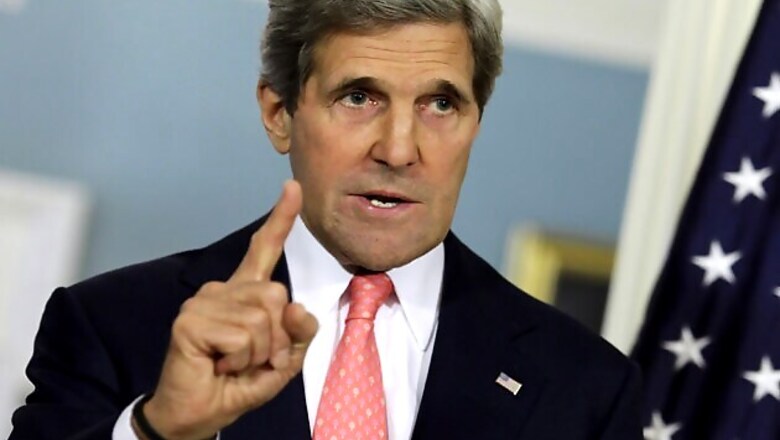
views
The Obama administration made a forceful case for limited US military action against Syria on Friday, releasing evidence the Syrian government had used chemical weapons against civilians multiple times in the past year and saying the "indiscriminate, inconceivable horror" could not go unpunished.
US Secretary of State John Kerry called Syrian President Bashar al-Assad "a thug and a murderer" but said any military response by the United States would be carefully measured to avoid open-ended commitments.
The White House released a four-page unclassified intelligence assessment that said an August 21 chemical weapons attack outside Damascus killed at least 1,429 civilians, including 426 children. It was one of multiple attacks, it said.
"History would judge us all extraordinarily harshly if we turned a blind eye to a dictator's wanton use of weapons of mass destruction," Kerry said at the State Department.
"So the primary question is really no longer, what do we know? The question is, what are we - we collectively - what are we in the world gonna do about it?"
The report was designed to bolster the case for a military response, as US President Barack Obama is under growing pressure to win support for military action from a war-weary public, skeptical lawmakers and international allies.
But Kerry did not present any specifics on a US response and did not lay out a timetable for action. He said the world was watching, however.
"If we choose to live in the world where a thug and a murderer like Bashar al-Assad can gas thousands of his own people with impunity, even after the United States and our allies said no, and then the world does nothing about it, there will be no end to the test of our resolve and the dangers that will flow," Kerry said.
Obama on Friday morning convened a meeting of his national security team, including Kerry and National Security Adviser Susan Rice, to discuss Syria, a White House official said.
Obama administration officials said the president was willing to go it alone, if necessary, after the British parliament voted late Thursday against a military strike intended to punish the Syrian government. France said on Friday it still backed action in Syria.
Any military strike appears to be delayed at least until UN investigators report back after leaving Syria, and some prominent lawmakers suggested on Thursday after a briefing from the administration that the White House should slow down the rush to action.
The timing is also complicated by Obama's departure for Sweden and a G20 summit in Russia on Tuesday. He was not expected to order the strikes while in Sweden or Russia.
Members of Congress have demanded they be consulted about a possible strike. They do not return to Washington for another week.
Obama's national security team is holding at least two more briefings on Syria via conference call for members of Congress on Friday, congressional aides told Reuters.
Polls show the public is largely opposed to US military action, and after the Thursday briefing some lawmakers said they were still not convinced of the need for it. Some questioned whether the Pentagon could afford to attack Syria after spending cuts imposed on the federal government earlier in 2013.
"I'm opposed to military intervention. We don't have the resources," Oklahoma Senator James Inhofe, the top Republican on the Senate Armed Services Committee, told MSNBC on Friday.
Administration officials are weighing their options on how to proceed, including possible missile strikes. Obama has said he does not want to get drawn into a protracted conflict, but wants to ensure that chemical weapons are not used again.
Rhode Island Democrat Jack Reed, a member of the Senate Armed Services Committee, said on MSNBC that the administration should try to avoid unilateral action. He hoped the release of an upcoming UN investigators' report would help build public support.
"I think the findings will be very helpful because they'll give an international perspective, one that is factually based, they've been on the ground. They've looked at the evidence. That would help immensely," Reed said.
Reed and other lawmakers said Britain's decision not to participate was significant. The British Parliament rejected military intervention in a 285-272 vote on Thursday, but British Defense Secretary Philip Hammond said he did not expect that would stop any action.
The top Democrat on the House Foreign Affairs Committee, Eliot Engel, said he was convinced in Thursday's White House briefing of the evidence of a chemical attack and that other countries such as Saudi Arabia and Turkey also understood the threat posed by Syria's Assad.
"I don't think it will be unilateral. I think we will have allies there," he told NBC's "Today" show. Asked who that might be, he said: "I don't know, but there will be others joining."
Former President George W Bush, who launched the invasion of Iraq in 2003, told Fox News's "Fox and Friends" program that Obama faced a tough decision.
"I was not a fan of Mr Assad. He's an ally of Iran and he's made mischief," Bush told Fox. "Putting our military in harm's way is the toughest decision a president will make."




















Comments
0 comment